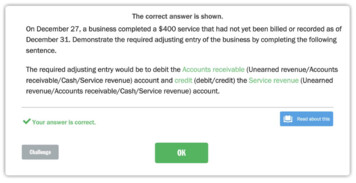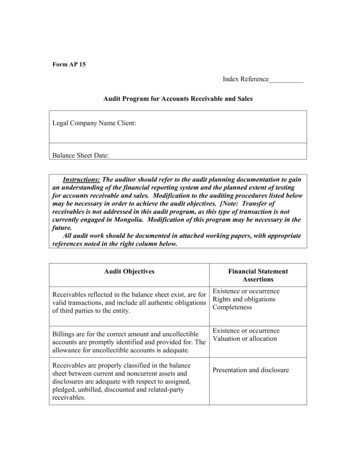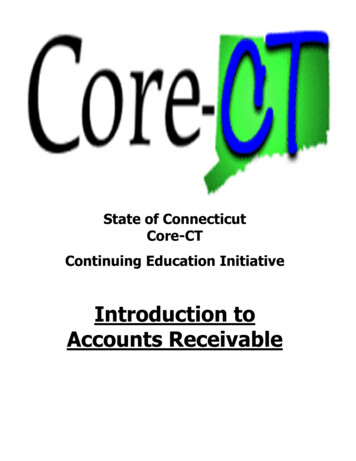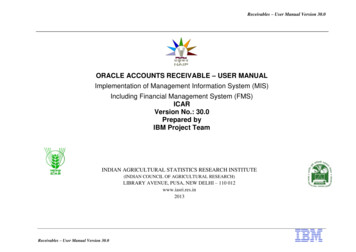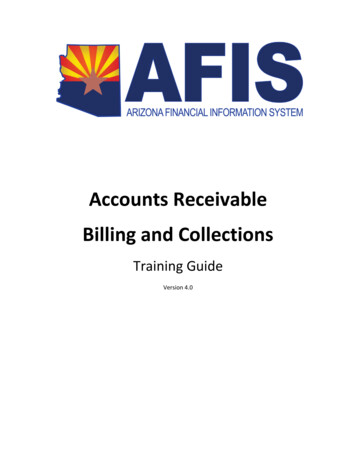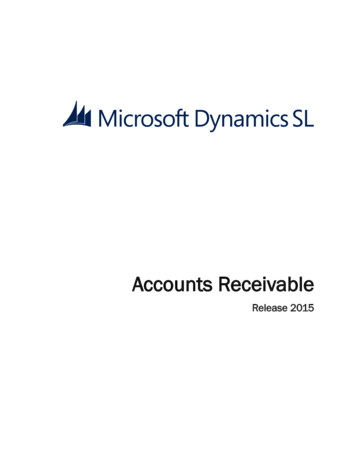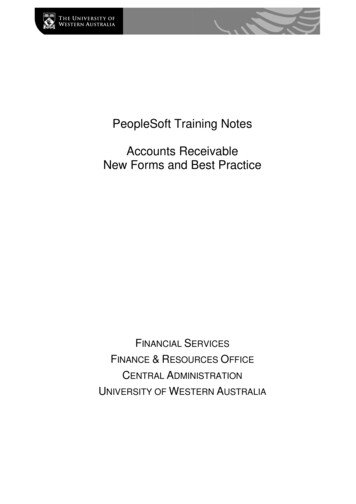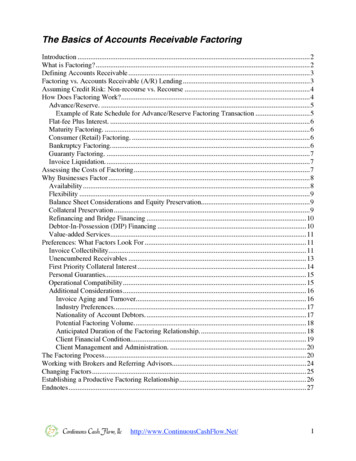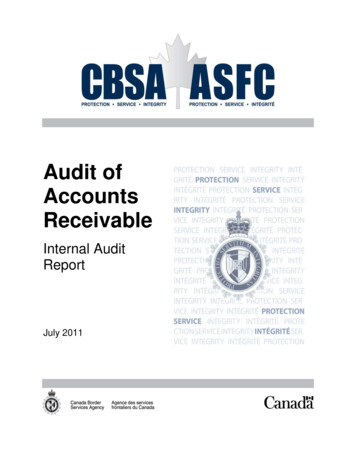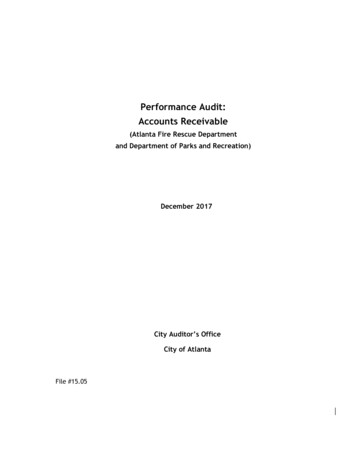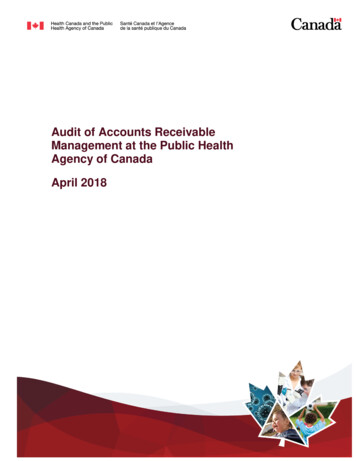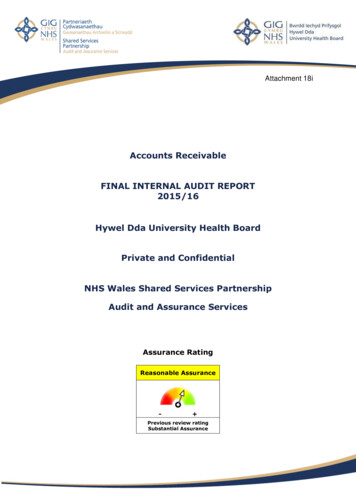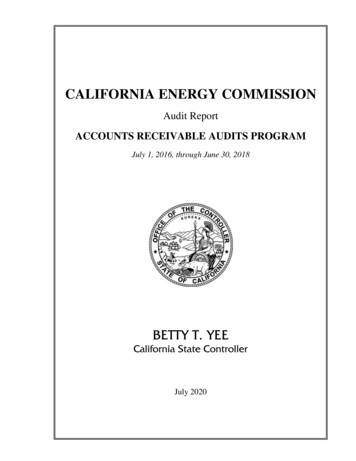
Transcription
CALIFORNIA ENERGY COMMISSIONAudit ReportACCOUNTS RECEIVABLE AUDITS PROGRAMJuly 1, 2016, through June 30, 2018BETTY T. YEECalifornia State ControllerJuly 2020
BETTY T. YEECalifornia State ControllerJuly 14, 2020Rob Cook, Deputy DirectorCalifornia Energy Commission1516 9th StreetSacramento, CA 95814Dear Mr. Cook:The State Controller’s Office audited the California Energy Commission’s (CEC) accountsreceivable and write-off process for the period of July 1, 2016, through June 30, 2018. Thepurpose of the audit was to determine whether CEC’s accounts receivable and write-offs arelegal, proper, and have sufficient supporting documentation.Our audit found that: CEC staff members did not complete the workbook report correctly, resulting in a 21,207,761 discrepancy; CEC staff members did not write off an unknown amount of uncollectible accountsreceivable; and The CEC had inadequate documentation to support accounts receivable.If you have any questions, please contact Andrew Finlayson, Chief, State Agency Audits Bureau,at (916) 324-6310.Sincerely,Original signed byJIM L. SPANO, CPAChief, Division of AuditsJLS/ascc: Lisa Negri, Chief AuditorCalifornia Energy CommissionRachael Rectenwald, Accounting Administrator IICalifornia Energy Commission
California Energy CommissionAccounts Receivable Audit ProgramContentsAudit ReportSummary .1Background .1Objectives, Scope, and Methodology .1Conclusion .2Follow-up on Prior Audit Findings .2Views of Responsible Officials .2Restricted Use .2Findings and Recommendations .3Attachment—California Energy Commission’s Response to Draft Audit Report
California Energy CommissionAccounts Receivable Audit ProgramAudit ReportSummaryThe State Controller’s Office (SCO) has completed an audit of theCalifornia Energy Commission’s (CEC) accounts receivable and write-offprocess for the period of July 1, 2016, through June 30, 2018.Our audit found that:Background CEC staff members did not complete the workbook report correctly,resulting in a 21,207,761 discrepancy; CEC staff members did not write off an unknown amount ofuncollectible accounts receivable; and The CEC had inadequate documentation to support accountsreceivable.We conducted the audit pursuant to Government Code (GC)section 12418, which states, “The Controller shall direct and superintendthe collection of all money due the State, and institute suits in its name.”The CEC, established by the Warren-Alquist Act in 1974, is the State’sprimary energy policy and planning agency. The CEC is made up of fiveCommissioners appointed by the Governor and confirmed by theCalifornia State Senate. The CEC was created to reduce energy costs andenvironmental impacts of energy use while ensuring a safe, resilient, andreliable supply of energy.Objectives, Scope,and MethodologyThe audit period was July 1, 2016, through June 30, 2018. The objectivesof our audit were to determine whether: The CEC maintained adequate internal controls over the accountsreceivable and write-off reporting process; The CEC complied with applicable state laws, rules, regulations, andpolicies related to the accounts receivable and write-off process; and The CEC’s accounts receivable and write-off transactions wereaccurate, approved by authorized personnel, and properly recorded.We achieved our audit objectives by: Reviewing the CEC’s policies and procedures applicable to accountsreceivables and write-offs; Reviewing prior audits and reviews related to the administration ofaccounts receivable and write-off transactions completed by theCEC’s internal audits unit; Interviewing members of the CEC’s accounting team responsible forprocessing accounts receivable and write-off transactions; Gaining an understanding of the CEC’s internal control overreceivables and write-offs; and Testing and examining accounting records and source documents.-1-
California Energy CommissionAccounts Receivable Audit ProgramThe random sample, using the random number generator on Excel andexcluding duplicates, included 49 (or 10%) of 498 transactions totaling 6,220,770 (or 6.5%) of a total 96,955,168.We conducted this performance audit in accordance with generallyaccepted government auditing standards. Those standards require that weplan and perform the audit to obtain sufficient, appropriate evidence toprovide a reasonable basis for our findings and conclusions based on ouraudit objectives. We believe that the evidence obtained provides areasonable basis for our findings and conclusions based on our auditobjectives.We limited our review of the CEC’s internal controls to gaining anunderstanding of the transaction flow and claim preparation process asnecessary to develop appropriate auditing procedures.ConclusionOur audit found that: CEC staff members did not complete the workbook report correctly,resulting in a 21,207,761 discrepancy; CEC staff members did not write off an unknown amount ofuncollectible accounts receivable; and The CEC had inadequate documentation to support accountsreceivable.Follow-up onPrior AuditFindingsWe have not previously conducted an audit of the CEC’s accountsreceivable and write-off processes.Views ofResponsibleOfficialsWe issued a draft audit report on March 2, 2020. Rob Cook, DeputyDirector, responded by letter dated March 16, 2020 (Attachment),agreeing with the audit results. This final audit report includes the CEC’sresponse.Restricted UseThis report is solely for the information and use of CEC and the SCO; it isnot intended to be and should not be used by anyone other than thesespecified parties. This restriction is not intended to limit distribution of thisaudit report, which is a matter of public record and is available on the SCOwebsite at www.sco.ca.gov.Original signed byJIM L. SPANO, CPAChief, Division of AuditsJuly 14, 2020-2-
California Energy CommissionAccounts Receivable Audit ProgramFindings and RecommendationsFINDING 1—Failure to completethe workbookcorrectlyOur audit found an accounts receivable balance discrepancy between the 112,477 reported to SCO by the CEC in its workbook and the 21,207,761 reported by the CEC in its annual Budgetary/Legal BasisFinancial Statements.CEC staff did not report the correct accounts receivable number on theworkbook submitted to SCO; the report incorrectly presented detailinformation on the accounts receivables balance, and the number andamount of delinquent accounts. CEC staff members were not properlytrained and lacked knowledge of how to properly complete the workbookreport.Per GC section 16583.2, state agencies must submit an annual report tothe Controller of the state agencies’ accounts receivable and dischargedaccounts.RecommendationWe recommend that the CEC: Review and analyze its accounts receivable; Ensure that future workbooks submitted to SCO reflect accurateinformation in accordance with GC section 16583.2; and Train staff members how to properly complete the workbook report.CEC’s ResponseThe CEC concurs with the State Controller’s findings.FINDING 2—Failure to write offuncollectibleaccounts receivableThe CEC did not write off any accounts receivable during the audit period.When the California State Accounting and Reporting System merged withthe Financial Information System for California, all of the CEC’s accountsreceivable dates were changed to the date of the merge. As a result, wecould not determine aging dates of accounts receivable, and we are unsurehow long accounts receivable have been outstanding.In its current system, CEC records indicate that a receivable is incomingwhen, in fact, that receivable is uncollectible and should be submitted forwrite-off. Discharging the receivable relieves the CEC from pursuingcollection. If all reasonable collection procedures do not result in payment,a department may request to “write off” or discharge uncollectibleamounts. Failure to do so may cause the CEC to overstate its accountsreceivable.State Administrative Manual (SAM) section 8776.6 states that eachdepartment should review its accounts receivable no less than quarterly, toidentify uncollectible amounts for discharge. When a departmentidentifies uncollectible amounts, it should file an application for dischargefrom accountability with the SCO.-3-
California Energy CommissionAccounts Receivable Audit ProgramGC section 13941 provides that, under certain conditions, statedepartments may file applications with the SCO for discharge fromaccountability for the collection of taxes, licenses, fees, or other moneydue and payable to the State.GC section 12438 provides that departments may refrain from collectingtaxes, license, fees, or money owed to the State if the amount be collectedis 500 or less, and the amount owed to the State is uncollectible or doesnot justify the cost of collection.RecommendationWe recommend that the CEC: Reconcile the two accounting systems to identify the outstandingaccounts receivable date and the actual original aging dates; and Ensure that accounts receivable are written off appropriately, inaccordance with SAM section 8776 and GC sections 13941 and12438.CEC’s ResponseThe CEC concurs with the State Controller’s findings.FINDING 3—Inadequatedocumentation tosupport accountsreceivable per StateAdministrativeManualsection 8776We found no Human Resource personnel documents to support oneemployee accounts receivable. We tested 49 of 489 transactions; accountreceivable transaction number 00004870, in the amount of 17.88, wasmissing supporting documentation.Employee documentation may have been misfiled, as CEC staff memberswere unable to locate employee accounts receivable records.Without proper supporting documentation, the CEC cannot ensure thatprompt and ongoing action has been taken for the collection of accountsreceivables.SAM section 8776 states that departments must ensure that properrecordkeeping is maintained. All efforts made toward the collection ofreceivables should be documented to include the dates and types ofcollection effort. Accounts receivable source documents (e.g. invoices),and documentation of collection efforts payments and adjustments, shouldbe retained for at least four years after the receivable has been paid.RecommendationWe recommend that the CEC maintain proper documentation to supportaccounts receivables at both the CEC Accounting and Human ResourcePersonnel Departments, in accordance with SAM section 8776.CEC’s ResponseThe CEC concurs with the State Controller’s findings.-4-
California Energy CommissionAccounts Receivable Audit ProgramAttachment—California Energy Commission’sResponse to Draft Audit Report
State Controller’s OfficeDivision of AuditsPost Office Box 942850Sacramento, CA 94250http://www.sco.ca.govS19-ARA-0003
California Energy Commission Accounts Receivable Audit Program-1- Audit Report The State Controller’s Office (SCO) has completed an audit of the California Energy Commission’s (CEC) accounts receivable and write-off process for the period of July 1, 2016, through June 30, 2018. Our audit found that:
